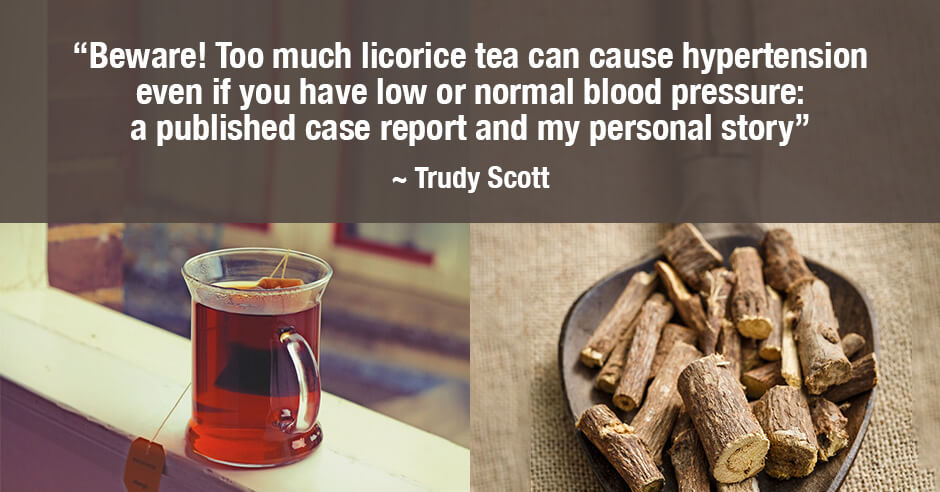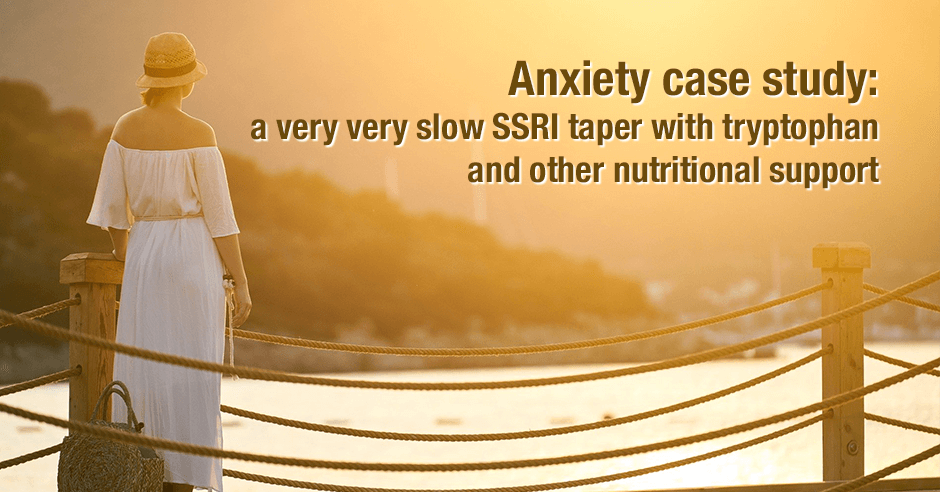
A 45-year-old woman presented to her general practitioner with a 4-month history of hot flushes, sweating and headaches. On examination, she was found to be hypertensive, and blood tests revealed mild hypokalaemia [low potassium].
While awaiting the results of further investigation into the cause of her elevated blood pressure, the patient conducted her own research and identified liquorice tea [licorice tea] as the potential cause of her symptoms. The patient had been drinking up to six cups of liquorice tea per day as a substitute for caffeinated tea and fruit-based infusions.
The patient immediately stopped consuming the drink and within 2 weeks her symptoms, hypertension and hypokalaemia, had entirely resolved.
This case report, Hypertension induced by liquorice tea, is eye-opening because this woman had always had low blood pressure and so she ignored the small print on the box that states “not advised for people with hypertension.”
I often see this caution about avoiding licorice if you have high blood pressure (hypertension). But I have yet to see a warning on a box of tea about the fact that licorice can actually cause high blood pressure with high consumption – even when your blood pressure is low or normal. I feel the latter aspect is not as well known, which is the reason for this blog.
I’m also sharing this case report and additional information because something similar has just happened to me (more on my story below).
Here are a few more facts about this patient’s case:
- She went to her doctor “with a history of hot flushes, night sweats and headaches. These symptoms had started over the preceding 4 months. The patient suspected that her symptoms were due to the onset of menopause.”
- Initially her blood pressure was 162/82 and “Repeat blood pressure measurement confirmed ongoing hypertension of 150/80 mm Hg”
- “Blood tests demonstrated mild hypokalaemia” (i.e. low potassium of 3.3 mmol/L).
- Two weeks after she stopped drinking the licorice tea, “repeat blood pressure measurement was 128/84 mm Hg and her hypokalaemia (and other symptoms) had resolved.”
I encourage you to read the entire published case report to get an understanding of the mechanisms of licorice mediating “its effect on blood pressure via the action of glycyrrhizin on the kidney.” And the impacts on sodium, potassium, aldosterone, cortisol/cortisone and blood pressure. I will add that this is one of many such case reports in the published research.
My story with elevated blood pressure after drinking Yogi Throat Comfort tea
As I mentioned above, I’m sharing this case report because something similar has just happened to me! I had been drinking Yogi Throat Comfort tea for just over a week to soothe my throat and help after my voice loss. It contains licorice root as well as slippery elm and other herbs.
My blood pressure is typically low at 110/80 or less (sometimes as low as 102/80) and last Friday it was 130/80 which is the highest it had ever been.
I didn’t make the connection to licorice right away because I had just flown internationally from Hawaii to Australia and we were sprayed with insecticide on the plane when we landed in Australia. We all had to sit there in the toxic soup for 10 minutes. (I’ll be sharing more about all this in a future blog).
I suffered severe vertigo the next day and it was at the doctor’s office that I found out my blood pressure was 130/80. I was very surprised but he felt it could be due to the travel or vertigo or voice issues. I also know that bereavement can have major physiological impacts and increased blood pressure is one of them (I was in Hawaii for my darling mom’s memorial).
I finally made the connection when my blood pressure measured 137/84 a few days later and stopped drinking the tea immediately. Over the next few days it came down to 127/93 and then 121/90 and then 118/84. I expect it to continue to come back down to my normal low blood pressure and will update this blog when it does.
As far as symptoms, I was just not feeling myself and had a strange feeling of apprehension, spaciness and breathlessness when talking too much. These are much improved having stopped the tea. My naturopath also recommended eating a banana each day to increase my potassium levels and to have epsom salt baths to help regulate the electrolytes in my body.
I will admit there are the above confounding/contributing factors – grief, voice loss, travel, vertigo, insecticide exposure – so I can’t be sure it’s only the licorice in the tea, and I’m not willing to test it out right now.
(Update Oct 13, 2023: A week later and it’s now pretty much back to my usual low blood pressure. Over the course of this last week it measured 125/82, 118/91, 127/84, 118/85 and today it’s 112/85. I will continue to track.)
How much licorice tea is too much?
The authors of the above case report mention this about the dose of glycyrrhizin:
- Experimental studies have shown that the rise in blood pressure caused by liquorice follows a linear dose–response relationship. Doses of as little as 75 mg of glycyrrhizin (equivalent to 50 g of standard liquorice confectionery) given daily for a 2-week period have been shown to cause a significant increase in systolic blood pressure (the first number).
- In a survey of 33 brands of liquorice tea, the mean glycyrrhizin content was found to be 126 mg/L (range 2–450 mg/L). A cup of liquorice tea with a volume of 250 mL could therefore be expected to contain, on average, approximately 31.5 mg of glycyrrhizin.”
- The European Scientific Committee on Food advises that regular glycyrrhizin doses of 100 mg/day present a risk to health, and advocate a safe average daily intake of no more than 10 mg/person/day. This is an amount equivalent to less than half a cup of liquorice tea or just 6 g of liquorice confectionery daily.
In the above published case, the patient had been “averaging around 4–6 cups per day, and had been consuming the licorice tea for about a year.” She was “unwittingly consuming daily volumes of liquorice tea containing up to 190 mg of glycyrrhizin, well in excess of the recommended limit” of 10 mg per day. It was 8 months before she started to notice the adverse effects, but I do wonder how long she had high blood pressure.
We have a home blood pressure monitor but I haven’t used it for ages and if I hadn’t gone in to the doctor for my vertigo, my elevated blood pressure may have gone unnoticed for a while too.
How much did I consume: a total of 10 Yogi Throat Comfort tea bags over the course of a week. The day before leaving I had a few cups of hot tea and was thrilled to be able to talk on my last day there. I then drank it all day on the 15+ hour flight back: I had 2 tea bags in my 2 liter / 2 quart water bottle and filled it up a few times with cold water. And I continued to do this once I was home, having it next to my bed if I woke up coughing in the night. I was probably getting 3 or 4 times more than the safe average daily intake of 10 mg/person/day.
I love licorice tea and drink it from time to time, maybe 2-4 cups a month. I’m quite surprised it affected me so quickly but have never consumed this amount and in such a concentrated time period.
Will I drink Yogi Throat Comfort tea or other herbal teas that contain licorice?
For now, I think I will – the Throat Comfort tea helped so much with my voice – but when I do I will monitor my blood pressure carefully and then make a final decision.
I also plan to dig a bit further into some of the confounding factors I mention above to see how they could possibly have made me more susceptible.
I do also have dietary oxalate issues so this could play into the effects of glycyrrhizin on the kidney. I’m finding mixed results on the oxalate content of licorice: some papers say high and some say low. But I didn’t have any of my typical oxalate reactions such as painful feet or eyes. I have, however, noticed some stiffness in my left hip the last few days so will be looking further into this aspect.
(Update Oct 13, 2023: Licorice tea is listed as low oxalate on the Trying Low Oxalates Facebook group but they will be updating their spreadsheet based on a paper I just shared with them – Oxalate in Foods: Extraction Conditions, Analytical Methods, Occurrence, and Health Implications “Licorice was the highest-oxalate food reported in this review with 3569.3 mg total oxalate/100 g FW (fresh weight).” (this is higher than spinach, sweet potatoes and rhubarb which are really high oxalate)
My takeaway messages – a warning and listen to your body
There is no licorice hypertension warning on this Yogi Throat Comfort tea box (or my Tulsi Licorice tea) and I do feel there should be 2 warnings: the usual warning about licorice if you have high blood pressure AND a general warning that licorice may also affect you if you have low or normal blood pressure.
My other takeaway message is this: listen to your body and get checked out when things don’t seem as they should be.
Has something like this happened to you? How much licorice tea did you consume, which brand and over what period?
Do you typically have low blood pressure and were you also caught by surprise?
Did you know about the caution to avoid licorice if you have high blood pressure?
And what about the fact that licorice may also affect you if you have low or normal blood pressure?
Feel free to share and ask your questions below.

